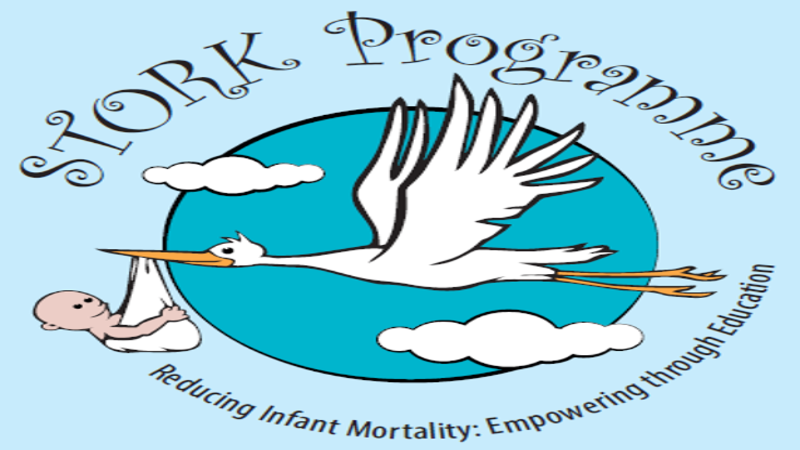Clinical Medicine
The STORK Programme: Reducing the risks for infant mortality
 |
|---|
STORK is an interactive empowerment programme for parents, families, and carers of new-born babies in the Midlands. It is aimed at reducing the risks for infant mortality in the region, and is led by Professor Tilly Pillay, Professor of Neonatology at University of Wolverhampton and a consultant neonatologist in intensive care at University Hospitals Leicester, holding a honorary position at the Royal Wolverhampton NHS Trust.
The Challenge for the West Midlands
At around 6 deaths per 1000 births (2016-2018 data), infant mortality in Wolverhampton is almost double the national average. The real reasons for this are complex, and whilst we have learned a huge amount in recent years, we still don’t fully understand all of the reasons for the high infant mortality in the region. There are a number of risk factors that health professionals know contribute to this problem.
Below are 5 important ways to reduce this risk during pregnancy and after the baby is born:
- Register for antenatal care early in pregnancy, and keep appointments with healthcare providers
- Stopping smoking - for more information see the National Centre for Smoking Cessation and Training website
- Avoiding alcohol - for more information see the NHS resource on alcohol and drugs in pregnancy
- Practising safe sleeping – for more information see the NHS resource on reducing the risk of cot death and The Lullaby Trust
- Breastfeeding where possible – for more information see the NHS resource on the benefits of breastfeeding
The Project
The Programme helps people understand some of the important risks for infant mortality in the region, and to provide information around key skills and knowledge that could help keep their baby safe, especially in the first few months of life.
The programme comprises guidance on topics around:
- Basic life support
- Dealing with a choking child
- Recognising signs of infant illness
- Safe sleeping, reducing the risks for sudden infant death in infancy
- Breast feeding support
- information on the risks of smoking in pregnancy and thereafter
- Local signposting to healthy lifestyles support
- Coping with a crying baby (ICON)
Example: One of its key objectives is to raise awareness on safe sleeping and therefore reduce the risks for Sudden infant Death Syndrome (SIDS). SIDS accounts for nearly 300 deaths across the UK, usually in the first 6 months of life. The exact causes are unknown, but the effects are devastating to families. We provide interactive education materials and sessions on safe sleeping, using educational resources available from the Lullaby Trust and NHS, reinforcing the positive protective effect that breast feeding has against SIDS, and the harmful effect of smoking.
Of the project, Dr Jonathan Odum, Medical Director, The Royal Wolverhampton NHS Trust, says:
‘The Stork project is a very exciting and important multi-partner project whose aim is to reduce risk and mortality to newborn babies and infants through an interactive educational and training programme for parents, carers and others who look after children. The project was pioneered and developed in Wolverhampton and was first used in the neonatal unit at New Cross Hospital. The Stork project has now been taken up widely across the Black Country including other health care Trusts, Academic institutions and Public Health and is acknowledged as an important resource for families and health professionals. There are already several documented instances where the Stork project has proven its’ worth in preventing significant harm coming to babies and we look forward to the project being further refined and its’ use implemented more widely across the West Midlands.’
Impact so far
The STORK Programme was first implemented in April 2016, with City of Wolverhampton Council Public Health Support, at Wolverhampton’s New Cross Hospital neonatal unit, at the Royal Wolverhampton NHS Trust. It is a programme that is, so far, well-liked by parents, carers, families and staff alike. Within the first two years of the programme, it was rolled out over 950 parents and family members at the neonatal unit and antenatal clinic services. STORK has since been embedded as a routine programme offered to all parents, family members and carers for babies on the neonatal unit at New Cross Hospital. It was rated as ‘an area of outstanding clinical service’ in the Care Quality Commission Inspection Report undertaken in 2019.
Following the initial roll out, it is now also offered to select vulnerable families, and select community midwifery services in the Wolverhampton region. The video on the right highlights the experience of a mother and her experiences with the STORK programme.
The Future
Work has commenced in partnerships with other neonatal units and Trusts in the region through a new initiative called The STORK Collaborative, which will include a research component focussing on quality assurance, research around parent/carer/family education, breast feeding psychology and support, amongst other aspects. Visit this page for more information on upcoming training dates, details of current and future partnerships.
Contact us
Email: tilly.pillay@nhs.net if you would like to discuss the project.


/prod01/wlvacuk/media/departments/digital-content-and-communications/images-18-19/iStock-163641275.jpg)
/prod01/wlvacuk/media/departments/digital-content-and-communications/images-2024/250630-SciFest-1-group-photo-resized-800x450.png)
/prod01/wlvacuk/media/departments/digital-content-and-communications/images-18-19/210818-Iza-and-Mattia-Resized.jpg)
/prod01/wlvacuk/media/departments/digital-content-and-communications/images/Maria-Serria-(teaser-image).jpg)
/prod01/wlvacuk/media/departments/digital-content-and-communications/images-2024/241014-Cyber4ME-Project-Resized.jpg)
/prod01/wlvacuk/media/departments/digital-content-and-communications/images-18-19/210705-bric_LAND_ATTIC_v2_resized.jpg)